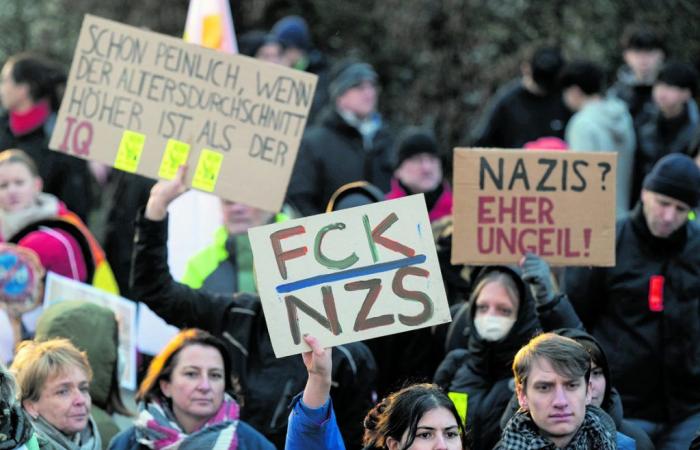It was a police operation worthy of the darkest times to extradite Maja T., 23, from Germany to Hungary, where she faces 24 years in prison on charges related to the same investigation that targeted MEP Ilaria Salis. The Court of Appeal declared the request for a European arrest warrant admissible on Thursday at 5:26 p.m., too late for the anti-fascist’s lawyer, Sven Richwin, to appeal the decision to the Federal Constitutional Court on the same day. But while he was preparing his appeal, things quickly escalated.
IN THE MIDDLE OF THE NIGHT German police took Maja from Dresden prison, where she had been under arrest since last December. She put it in the car and quickly headed towards the Austrian border. Here the person was handed over to the Vienna officers at 6.50 yesterday morning. Forty-eight minutes later her lawyer handed over the request to suspend extradition to the highest court based in Karlsruhe. The first section took only three hours to decide: the handover to the Budapest authorities must be prohibited until the decision on the constitutional appeal to be presented within six weeks. “The Berlin Prosecutor’s Office is instructed to take appropriate measures to prevent the applicant from being handed over to the Hungarian authorities and to obtain his return to the Federal Republic of Germany,” the constitutional justice body had ordered. At that point, however, Maja had already been in Hungarian territory for fifty minutes. The order to bring her back remains with the prosecutor’s office in the German capital but it is not clear how this will happen and what the posture of Budapest will be, where at the moment there are no reactions.
The editorial team recommends:
The Honorable Ilaria Salis: «I bring my history and social movements to Europe»
THE ACCUSATIONS AGAINST Maja T. is said to have taken part in two attacks in 2023, just before the Day of Honour, which on 11 February each year draws hundreds of neo-Nazis to the Hungarian capital, eager to celebrate the failed attempt by an SS battalion to break the siege of the Red Army during the Second World War. The first attack is said to have taken place in the morning hours of 9 February against a Hungarian and two Poles, presumably right-wing extremists. The second attack occurred during the night of the following day against two men outside a neo-Nazi concert. There is one element that is causing great concern among family members and activists regarding Maja’s extradition: she is a non-binary person (in this article we use the feminine only where it is not possible to do otherwise, ndr). Her documents are male, although she does not identify with this gender. It is therefore likely that she will be locked up in a prison for men. It is easy to imagine the risks that a German queer antifascist runs in a prison for Hungarian men.
BUDAPEST HAS INSURED which will guarantee adequate detention conditions and the Berlin embassy will be able to verify this, but it is clear that the standards of the Hungarian country are incompatible with those of other EU states. The Salis affair bears witness to this: shackles, chains, collars, inability to communicate for months, lack of translations, inedible food, mice in cells, reduced healthcare. «This extradition is a scandal. It is a gift from the traffic light coalition (social democrats-green-liberals, ndr) to the Orbán regime in exchange for assuming the presidency of the European Council?”, asks Martin Schirdewan, Linke MEP and co-president of the European Left. “In Hungary you cannot expect a fair trial,” echoes Carola Rackete, also elected in Strasbourg with the red party. “Extradition is against the European Convention on Human Rights,” says Green MP Madeleine Henfling. In fact, in the similar case of Gabriele Marchesi, the Court of Appeal of Milan rejected the European arrest warrant sent by Budapest, on the basis of the prison conditions the boy would have faced and the disproportion between the facts contested and the sentences requested.
The editorial team recommends:
Hungarian prisons scare judges. Marchesi stays at home
UPWARD THE story there is the mother of all German investigations against anti-fascists. It concerns the one that the newspapers have named Hammerbandethe alleged “hammer gang” accused of attacks against neo-Nazis. The key witness in the case is Johannes Domhöver, a former left-wing militant who was removed from the collectives for some episodes of harassment and then became a police informer. According to his reconstruction, the first act of the Antifa dates back to January 12, 2015: street clashes in Leipzig during a demonstration by Pegida, the “European Patriots against the Islamization of the West”, a far-right organization considered close to Alternative für Deutschland (Afd) and Die Heimat (the homeland), the National Democratic Party of Germany. Dohmhöver’s testimonies were decisive in the trial of Johann Guntermann, considered the leader of the Antifa and sentenced in 2017 to two and a half years for various actions that occurred from 2015 onwards. Released in September 2019, Guntermann was later accused of other actions and is currently a fugitive.
THE PROCESS However, what is more important to German anti-fascists is the one in which Lina Engel was the main accused. The woman ended up in prison on 5 November 2020 and, in June last year, she was sentenced to 5 years and 3 months, with release pending the appeal sentence. Dresden judge Hans Schlüter-Staats was keen to underline that, although it is not possible to avoid punishing attacks on neo-Nazis, it is clear that in Germany investigations against ultra-right movements present “deplorable shortcomings”.
The editorial team recommends:
«Record number of prisoners and critical conditions in Hungary»
ON THE BASE of the associative hypothesis of the “hammer”, and probably of documentation provided by the German prosecutors, the charges in Hungary for the events of February 2023 were built. In addition to Marchesi and Salis, they involve a man and a woman on trial with the MEP, Maja and Hannah S., a 29-year-old arrested on May 6 in Nuremberg and taken to Karlsruhe. She is charged with criminal association although there is no evidence that she participated in the clashes in Budapest. The fear is that sooner or later Hungary will also request her extradition.
TEN MORE ANTI-FASCISTS are still at large. In recent months they have said they are willing to appear before the German authorities on the condition that they are not handed over to Hungary. But the German judicial authorities have refused. “They are only asking for their charges to be assessed in a trial with constitutional guarantees,” said the father of one of the antifa, interviewed by the public television of Saxony and Thuringia Mdr.
FOR THE WHOLE STORYincluding the prosecution system in Budapest, the statements that Domhöver will make at the federal court in Dresden in September, when his interrogation is scheduled to resume, will be decisive.





